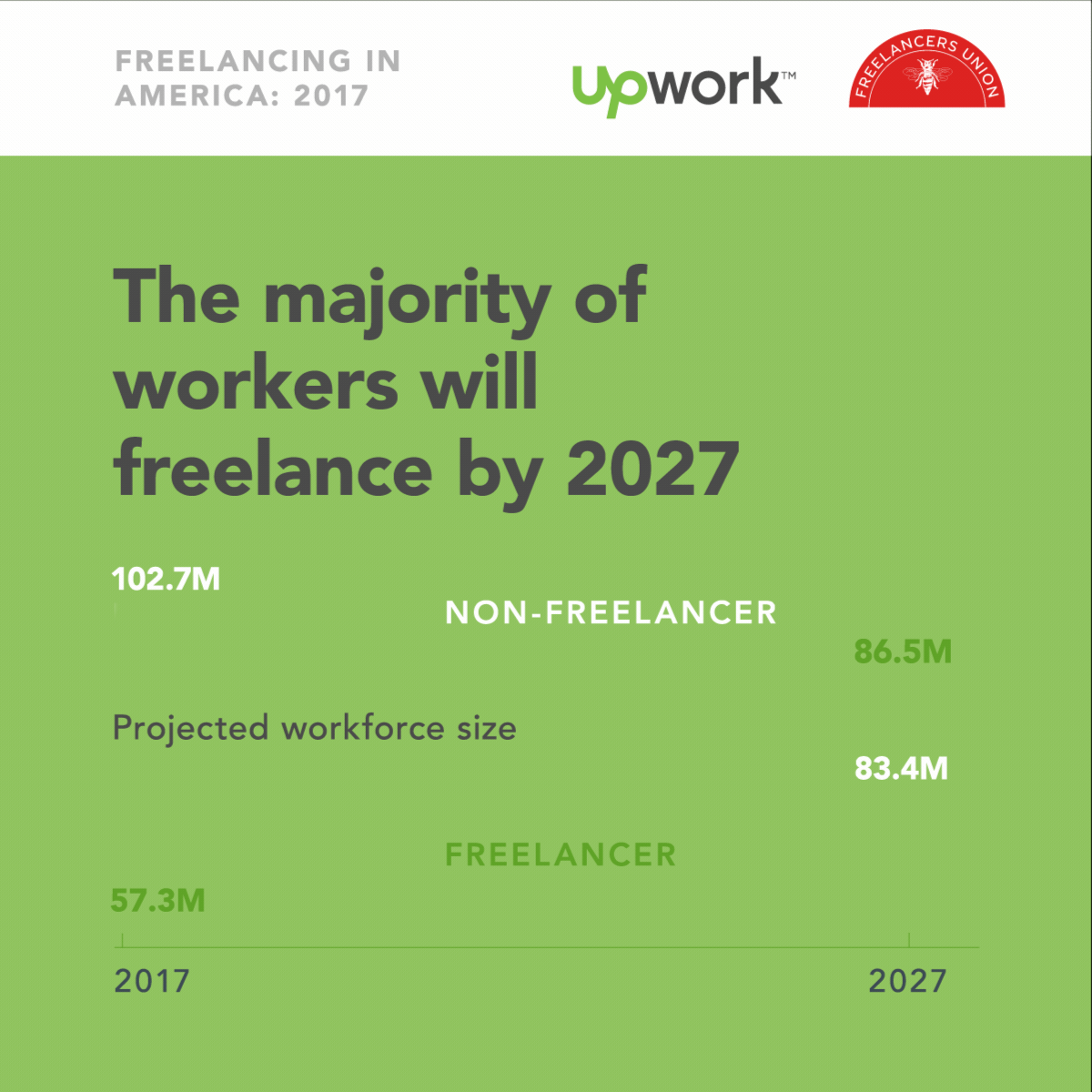
There’s a common misconception that freelancers are just like “temps,” professionals hired by companies for more short-term, low-value projects. It’s an outdated notion that freelancers only help with busywork and small jobs—things like data entry and filing—that don’t contribute to more mission-critical projects, while full-time employees spearhead new, large-scale projects.
The reality is quite the contrary: Companies are using freelancers for strategic, high-impact projects. These professionals are valuable assets to small businesses that need cutting-edge, in-demand skills to scale and get more done.
Freelancers are not in the minority anymore, either. As more businesses take a flexible approach to work, the freelance population has grown three times faster than the overall U.S. workforce since 2014. It’s predicted that in the next decade, they’ll make up a majority of the U.S. workforce that was previously dominated by traditional 9-to-5 employees.
Here’s a look at some of the ways freelancers are contributing value to high-profile projects.
Freelancers help small businesses meet higher demands while keeping overheads low
For small businesses, in particular, balancing low overheads with high-velocity production cycles can make it difficult to justify the cost and effort to hire full-time employees who have in-demand skills. During slower periods, the cost to keep full-time employees on board can be a drain on resources, particularly when you don’t need that expertise year-round. Freelancers can be an affordable alternative, offering elastic resources for those changing demands.
Also, telecommuting allows businesses to save on operating costs and office expenses while getting the same level of productivity, engagement, and value.
Businesses can quickly fill technical or in-demand job openings
To adopt the new technology and services businesses need to stay competitive and nimble, they’re increasingly turning to freelancers. Say a small business’s IT manager who handles everything from system administration and networking is working with business owners to devise a strategy for a more cost-effective cloud storage option. On top of day-to-day responsibilities, this IT manager would need to acquire training to work with this new complex cloud technology. Instead, the business hires a freelance specialist from Upwork to oversee the migration.
Freelancers can save the day with tight deadlines and last-minute personnel changes.
It’s not uncommon for individuals at small businesses to wear a few hats or handle things entire teams might manage in larger companies. Small businesses also put a premium on their time and have less flexibility when it comes to time-consuming HR processes. When a team member instrumental to a department leaves, it’s less likely there’s someone with enough bandwidth to absorb that employee’s work. A fast way to get the help they need without business coming to a grinding halt? Hiring skilled freelancers.
Say there’s an in-house designer at a regional manufacturer who updates the website, designs collateral sales material, creates signage and tradeshow materials, and pitches in with marketing. When the company needs a video to show off a new piece of welding equipment, the designer can help shoot the footage but doesn’t have the experience to edit it. Hiring a freelancer video editor helps the company get that polished, finished cut faster without interrupting other processes.
Businesses can adopt the latest technologies or quickly spin up new prototypes.
There’s nothing low-value about restructuring your IT infrastructure or adopting a cutting-edge new technology—something more businesses are entrusting freelancers to do. It makes sense to hire individuals with niche expertise in the newest technologies to ensure critical updates happen smoothly.
Another fast-growing use case for freelancers is to help quickly spin up prototypes. Rapidly prototyping ideas from concept through to a functional design is possible when a business unit can directly collaborate with a freelance expert like a designer or mobile developer.
Freelancers are removing barriers to scale.
Small businesses can meet new demands as they arise rather than missing out on valuable opportunities because they can’t handle them. This is especially true when it comes to customer service, content writing, or engineers skilled in the newest frameworks and platforms.
If a business recently launched a new site, app, product, or service, it’s not uncommon for there to be a response—whether that’s a boost in web traffic, calls from inbound marketing efforts, or customer service inquiries that need responses.
Freelancers can contribute to nearly any category within an organization.
Freelancers aren’t just short-term administrators, copywriters, accountants, or SEOs—they can be instrumental and consult on many high-level, business-critical operations like marketing, IT, engineering, and customer service. As businesses hire remote talent across their organizations, freelancers are cementing their value more than ever before.
This is especially true in smaller companies where HR and finance functions tend to be spread out across their staff rather than a dedicated HR department. This leads to more teams hiring when and where they need to. According to Upwork’s data, the three departments most often utilizing skilled freelancers at scale are operations, IT and engineering, and marketing—three areas with plenty of high-value projects.
Read more:
